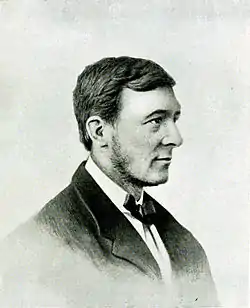Daniel Hanbury
Daniel Hanbury FRS (11 September 1825 – 24 March 1875), a British botanist and pharmacologist, was one of the leading 19th century experts on pharmacognosy, the study of the medicinal applications of nature, principally of plants.
Daniel Hanbury | |
|---|---|
 Portrait of Daniel Hanbury, from Hortus Mortolensis, 1912 | |
| Born | 11 September 1825 |
| Died | 24 March 1875 (aged 49) Clapham |
| Resting place | Quaker burial ground, Wandsworth |
| Nationality | British |
| Alma mater | Pharmaceutical Society |
| Known for | Giardini Botanici Hanbury, La Mortola |
| Scientific career | |
| Fields | pharmacology, botany, pharmacognosy |
| Institutions | London, La Mortola |
| Author abbrev. (botany) | D.Hanb |
Life
Son of a Quaker pharmacist, Daniel Bell Hanbury (1794-1882), and his wife Rachel Christy (1802-1876), Daniel Hanbury grew up in London. Entering his father's firm, Allen, Hanbury and Barry, at the age of 16, young Daniel quickly proved a valuable and capable employee. His life was dedicated to his work, into which he threw himself with great energy. Hanbury, who never married, was a vegetarian, and like many of his Victorian contemporaries, opposed the use of alcohol and tobacco.
He retired from business in 1870 and died in Clapham of typhoid fever. He was buried in the burial ground of the Society of Friends at Wandsworth.[1]
Work
Hanbury's extensive knowledge of the world's botany was based on years of study, collecting and travel - trips to the Middle East and throughout Europe were supplemented by extensive correspondence with colleagues throughout the world. He was an essential partner to his brother, Sir Thomas Hanbury, in selecting specimens for and establishing the Giardini Botanici Hanbury at La Mortola, now maintained by the University of Genoa. On his death, Sir Thomas donated his brother's entire botanical cabinet collection to Kew Gardens,[2] where it is now part of the Economic Botany Collection.
Hanbury's first published contribution, in volume 1 of the Transactions of the Pharmaceutical Society, was published soon after starting his work. It was followed, regularly, by a stream of articles and papers describing the pharmacological applications of various plants, insects, and chemicals, and published in such distinguished sources as the Pharmaceutical Journal and the Transactions of the Linnean Society.
During his career he served as President of the British Pharmaceutical Conference, as Botanical Examiner of the Board of Examiners of the Royal Pharmaceutical Society (served, 1860-1872; elected member 1857[3]), and in several other major professional capacities. He was elected a Fellow of the Royal Society in 1867.[4]
Bibliography
Hanbury's published works include:
- Pharmacographia; A History of the Principal Drugs of Vegetable Origin met with in Great Britain and British India (1874) (1879 edition revised by Friedrich Flückiger)
- Science Papers, Chiefly Pharmacological and Botanical (1876), a compendium of his papers, articles and journal contributions.
Notes
- Geoffrey Tweedale (2009). Hanbury, Daniel (1825–1875). Oxford Dictionary of National Biography, online edition. doi:10.1093/ref:odnb/12179.
- "The Hanbury Herbarium at Kew Gardens". Archived from the original on 29 June 2011. Retrieved 20 January 2011.
- "Memoir of Daniel Hanbury" published in his Science Papers ... (p. [3]-40)
- "Library and Archive Catalogue". Royal Society. Retrieved 9 March 2012.
- IPNI. D.Hanb.
References
- Kew Gardens biography of Hanbury, cited 20 January 2011.
- Hanbury biography at Herbaria@Home, cited 20 January 2011.
External resources
| Wikimedia Commons has media related to Daniel Hanbury. |
- Kew Gardens, Economic Botany Collection biography of Daniel Hanbury
- "Memoir of Daniel Hanbury" published in his Science Papers ... (p. [3]-40)
- Contemporary review of Science Papers